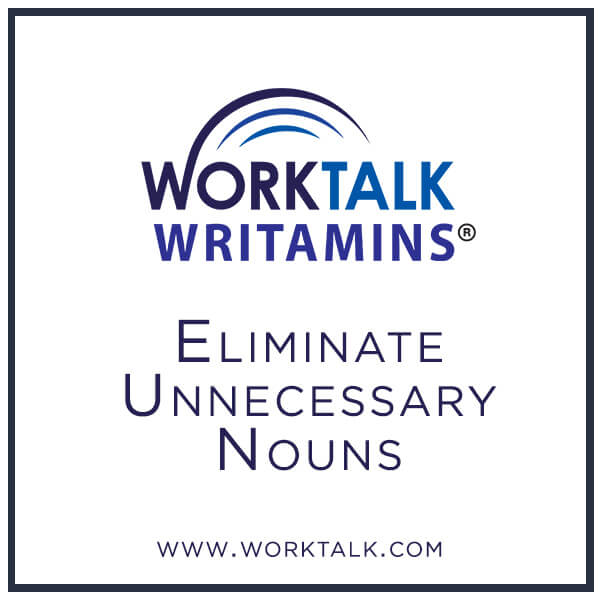
Quick: What is a noun?
No matter where you went to elementary school, your brain probably leapt into action, screaming, “I know that! I know that! A noun is a person, place, or thing.” And that’s true. A noun is a person, place, thing, or concept.
And what is a verb?
Your brain triumphs again: “Action or being!”
You might not know the name of the second president of the United States, but you know the difference between a noun and a verb. (By the way, it was John Adams.)
So we know, by definition, that nouns just sit there, unmoving, until they encounter a verb. Verbs are the motors of language, powering our ideas and descriptions and making them forge ahead. The higher the ratio of verbs to nouns, the more brisk and energetic your writing will be.
What happens when there are too many nouns in a sentence? The reader bogs down. Excess nouns are sludge in the system, slowing the transmission of meaning. Am I proposing that we abolish nouns? Not at all. But I am proposing that we review our work in search of needless nouns and that we change those nouns to verbs or adjectives. This simple technique will enliven your writing immeasurably.
Nouns That End in –ation, -ibility, -ness, and Other Endings
When seeking needless nouns, watch for words whose roots could be verbs or adjectives. Let them expand into beautiful, energetic words that will carry your meaning straight to your reader’s heart. In this category, -ation words are ripe for change. Look to the left of the -ation ending, and you will find a lovely verb waiting to be discovered.
Consideration becomes consider
Determination becomes determine
Authorization becomes authorize
What other –ation words can you think of?
Consider this example:
James is available for consultation in support of your manufacturing goals.
In this sentence, we have the nouns consultation and support, both of which can be turned into verbs. Is this version stronger?
You can consult with James to support your manufacturing goals
Note that the verbal version is shorter, too.
Nouns don’t always have to become verbs. They can also become adjectives, as in the following example:
Improve the effectiveness of technical, strategic, and growth decisions by consulting a proven expert.
Effectiveness is a stodgy noun. Let’s change it to effective, as in:
Make your technical, strategic, and growth decisions more effective by consulting a proven expert.
Here’s another example:
Whoever turns on the copy machine after business hours bears responsibility for turning it off.
While this is not a terrible sentence, it’s a little huffy. How about:
If you turn on the copy machine after business hours, you are responsible for turning it off.
Verbs Make Your Message Feel More Authentic
Using needless nouns may diminish the value of your message. How would you feel if someone gave you the following advice?
It is my belief that making the choice of plan A would be to your benefit.
This sentence contains the nouns belief, choice, and benefit. Changing all these to verbs yields:
I believe that choosing plan A would benefit you.
Which advice feels more sincere and authentic?
In the Worktalk Writing Workshop, we spend a block of time on identifying needless nouns and writing with verbs.
Needless nouns mummify your message. I am of the belief that usage of excess nouns and non-usage of vivid verbs will have the effect of making your writing seem less sincere and direct.
